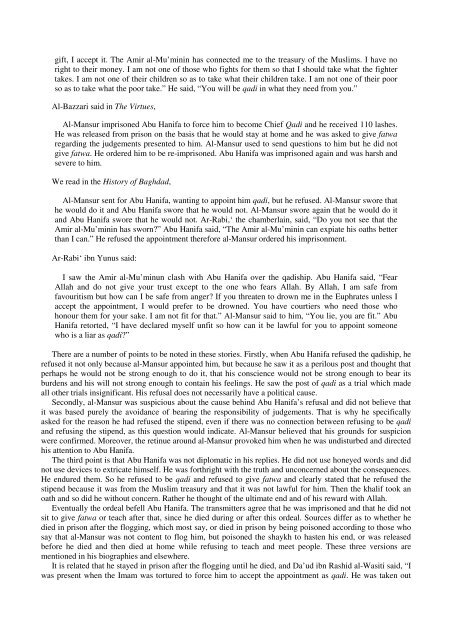You also want an ePaper? Increase the reach of your titles
YUMPU automatically turns print PDFs into web optimized ePapers that Google loves.
gift, I accept it. The Amir al-Mu’minin has connected me to the treasury of the Muslims. I have no<br />
right to their money. I am not one of those who fights for them so that I should take what the fighter<br />
takes. I am not one of their children so as to take what their children take. I am not one of their poor<br />
so as to take what the poor take.” He said, “You will be qadi in what they need from you.”<br />
Al-Bazzari said in The Virtues,<br />
Al-Mansur imprisoned <strong>Abu</strong> <strong>Hanifa</strong> to force him to become Chief Qadi <strong>and</strong> he received 110 lashes.<br />
He was released from prison on the basis that he would stay at home <strong>and</strong> he was asked to give fatwa<br />
regarding the judgements presented to him. Al-Mansur used to send questions to him but he did not<br />
give fatwa. He ordered him to be re-imprisoned. <strong>Abu</strong> <strong>Hanifa</strong> was imprisoned again <strong>and</strong> was harsh <strong>and</strong><br />
severe to him.<br />
We read in the <strong>His</strong>tory of Baghdad,<br />
Al-Mansur sent for <strong>Abu</strong> <strong>Hanifa</strong>, wanting to appoint him qadi, but he refused. Al-Mansur swore that<br />
he would do it <strong>and</strong> <strong>Abu</strong> <strong>Hanifa</strong> swore that he would not. Al-Mansur swore again that he would do it<br />
<strong>and</strong> <strong>Abu</strong> <strong>Hanifa</strong> swore that he would not. Ar-Rabi,‘ the chamberlain, said, “Do you not see that the<br />
Amir al-Mu’minin has sworn?” <strong>Abu</strong> <strong>Hanifa</strong> said, “The Amir al-Mu’minin can expiate his oaths better<br />
than I can.” He refused the appointment therefore al-Mansur ordered his imprisonment.<br />
Ar-Rabi‘ ibn Yunus said:<br />
I saw the Amir al-Mu’minun clash with <strong>Abu</strong> <strong>Hanifa</strong> over the qadiship. <strong>Abu</strong> <strong>Hanifa</strong> said, “Fear<br />
Allah <strong>and</strong> do not give your trust except to the one who fears Allah. By Allah, I am safe from<br />
favouritism but how can I be safe from anger? If you threaten to drown me in the Euphrates unless I<br />
accept the appointment, I would prefer to be drowned. You have courtiers who need those who<br />
honour them for your sake. I am not fit for that.” Al-Mansur said to him, “You lie, you are fit.” <strong>Abu</strong><br />
<strong>Hanifa</strong> retorted, “I have declared myself unfit so how can it be lawful for you to appoint someone<br />
who is a liar as qadi?”<br />
There are a number of points to be noted in these stories. Firstly, when <strong>Abu</strong> <strong>Hanifa</strong> refused the qadiship, he<br />
refused it not only because al-Mansur appointed him, but because he saw it as a perilous post <strong>and</strong> thought that<br />
perhaps he would not be strong enough to do it, that his conscience would not be strong enough to bear its<br />
burdens <strong>and</strong> his will not strong enough to contain his feelings. He saw the post of qadi as a trial which made<br />
all other trials insignificant. <strong>His</strong> refusal does not necessarily have a political cause.<br />
Secondly, al-Mansur was suspicious about the cause behind <strong>Abu</strong> <strong>Hanifa</strong>’s refusal <strong>and</strong> did not believe that<br />
it was based purely the avoidance of bearing the responsibility of judgements. That is why he specifically<br />
asked for the reason he had refused the stipend, even if there was no connection between refusing to be qadi<br />
<strong>and</strong> refusing the stipend, as this question would indicate. Al-Mansur believed that his grounds for suspicion<br />
were confirmed. Moreover, the retinue around al-Mansur provoked him when he was undisturbed <strong>and</strong> directed<br />
his attention to <strong>Abu</strong> <strong>Hanifa</strong>.<br />
The third point is that <strong>Abu</strong> <strong>Hanifa</strong> was not diplomatic in his replies. He did not use honeyed words <strong>and</strong> did<br />
not use devices to extricate himself. He was forthright with the truth <strong>and</strong> unconcerned about the consequences.<br />
He endured them. So he refused to be qadi <strong>and</strong> refused to give fatwa <strong>and</strong> clearly stated that he refused the<br />
stipend because it was from the Muslim treasury <strong>and</strong> that it was not lawful for him. Then the khalif took an<br />
oath <strong>and</strong> so did he without concern. Rather he thought of the ultimate end <strong>and</strong> of his reward with Allah.<br />
Eventually the ordeal befell <strong>Abu</strong> <strong>Hanifa</strong>. The transmitters agree that he was imprisoned <strong>and</strong> that he did not<br />
sit to give fatwa or teach after that, since he died during or after this ordeal. Sources differ as to whether he<br />
died in prison after the flogging, which most say, or died in prison by being poisoned according to those who<br />
say that al-Mansur was not content to flog him, but poisoned the shaykh to hasten his end, or was released<br />
before he died <strong>and</strong> then died at home while refusing to teach <strong>and</strong> meet people. These three versions are<br />
mentioned in his biographies <strong>and</strong> elsewhere.<br />
It is related that he stayed in prison after the flogging until he died, <strong>and</strong> Da’ud ibn Rashid al-Wasiti said, “I<br />
was present when the <strong>Imam</strong> was tortured to force him to accept the appointment as qadi. He was taken out














